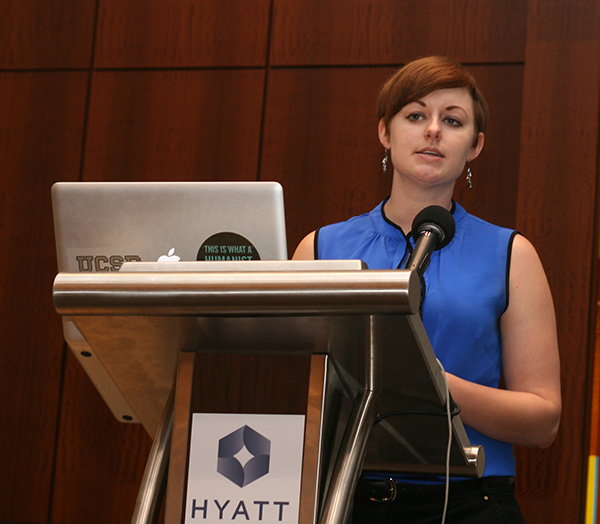Baptists have consistently said two things about sex — “don’t do it, at least not until marriage” and “don’t talk about it” — a gender and sexuality scholar said in a workshop at last week’s Cooperative Baptist Fellowship General Assembly on how to engage in constructive conversations about sexuality in a context of diversity and division.
Shawn Warner-Garcia, a Ph.D. candidate in the linguistics department at the University of California Santa Barbara, said based on her research, the overwhelming majority of Baptists feel that their faith communities don’t adequately address issues of sexuality, or when they address it at all it’s almost always in negative terms.

Shawn Warner-Garcia aims to create a resource on sexual ethics that can be used by churches and individuals to facilitate better conversations around faith and sexuality. (CBF photo)
“We need to do more, and we need to do better,” said Warner-Garcia, who grew up attending a CBF church and whose father, Greg Warner, was the first executive editor of Associated Baptist Press, a precursor of Baptist News Global.
Her research began with an “event ethnography” — a method of trying to understand a culture by talking to people and observing their behavior — at a conference on sexuality and covenant co-sponsored by CBF and Mercer University in 2012.
The current phase involves collecting data with an anonymous online survey on faith and sexuality among Christians in the United States. Of more than 500 respondents so far, 180 identify either currently or in the past as part of a Baptist community.
Warner-Garcia said recurring themes include “abstinence before marriage was the expected norm, but sex was not a topic of polite conversation” and memories of a “purity culture” where modesty was the biggest priority and consent was not discussed at all.
Findings include the median ages of first sexual activity, excluding intercourse, 16 years old; first intercourse, 20; and number of sexual partners, three.
More than 80 percent of Baptists said they have used pornography before in their lifetime, 23 percent never or almost never use STI or pregnancy prevention, and 27 percent have been unfaithful in a committed relationship. On the positive side, 82 percent are satisfied in their current sexual relationship.
Breaking down the sexual identity or orientation among Baptists who took the survey, Warner-Garcia found percentages higher than the national average of people who identify as bisexual, gay, lesbian, queer or questioning.
“This may be due to my recruitment, the sampling methods for survey respondents,” she said. “I’m a gender and sexuality scholar. I tend to know more people who have alternative gender and sexual identities. I use pretty much just word of mouth to get the word out about this survey.”
Another possibility, she added, “could also be due to the fact that I just ask people different questions than some of the national surveys.”
She found large numbers of Baptists who said the way they identify in private is different from their public sexual identity, and 40 percent said they had experienced forced sexual contact — either within or outside of marriage — at some time in their life.
Responses to a question about what people wish their church had taught them about sex include that purity and self-worth aren’t interconnected, what consent means, how to be faithful and gay, and “I wish I had learned about sexuality from people with wisdom rather than from peers and porn.”
Warner-Garcia said one of her long-term research goals “is to create an open source resource on sexual ethics that can be used by churches and individuals to help facilitate better conversations around faith and sexuality.”
She said the resource will be educational, rather than primarily theological or devotional, and easily and readily available online. It will need to be interesting, interactive and multi-media. As an open source resource it will be free of cost, and there also won’t be any gatekeepers. It will include multiple points of view but be adaptable to particular user and community needs.
“It’s going to be diverse,” she said. “It’s going to represent the diversity of our different moral understanding of human sexuality. More importantly it’s going to focus on tracing the sources of authority that we draw on when we make these moral decisions.”
Warner-Garcia said the project “won’t promote a particular moral standard” but ultimately will “empower users to make decisions through learning, prayer and discussions with family, peers and in their faith communities.”
To take the survey, click here.
Related stories:
Illumination Project seeks light, not heat, on controversial issues, task force reports at CBF
Gushee: Covenant best model for sexual relationship
Are Protestants concealing a Catholic-size sexual abuse scandal?
